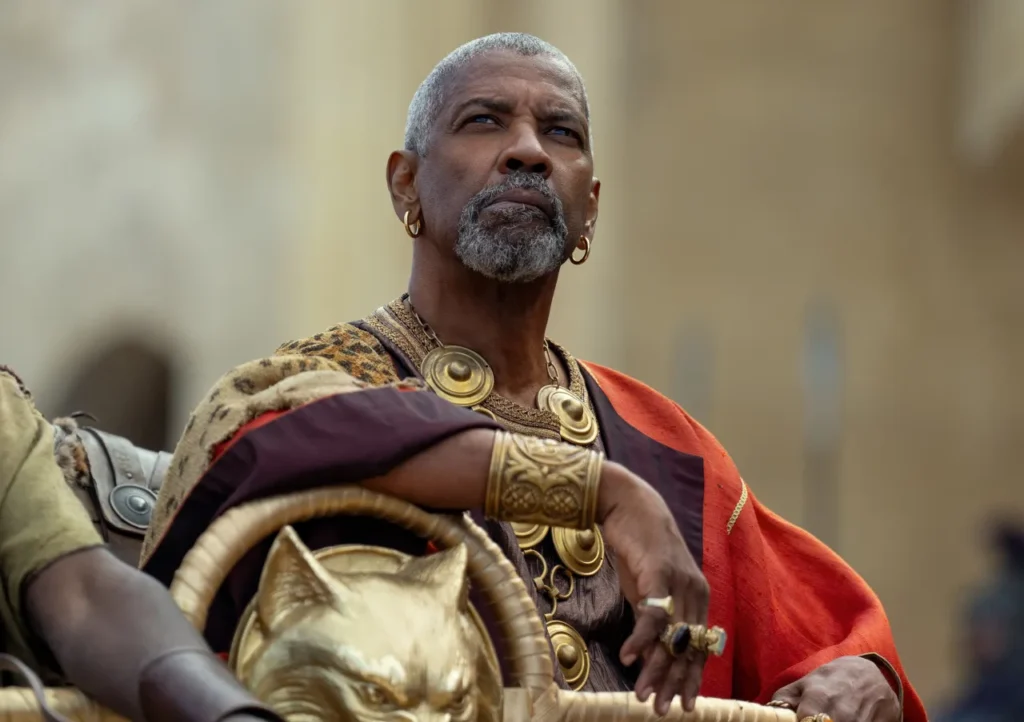In one of the most incisive scenes in Ridley Scott’s “Gladiator” (2000), Maximus (Russell Crowe) laments the limits of his powers as a smoldering arena brute. “I have the power to amuse a mob,” he says disdainfully. “That is power,” Lucilla (Connie Nielsen) replies.
That’s the power of combat, the power of cinema, and the power of Scott. His dalliances with arthouse surrealism in “Blade Runner” (1982) and “Legend” (1985) aside, Scott has never lost his desire to play to the crowd—to thrill them, to move them, to make them cheer as villainous Romans are gobbled up by sharks.
“Gladiator” conquered the box office and the Oscars with a fast-casual recipe: Crowe’s noble brooding, Scott’s flamboyant showmanship, and Hans Zimmer and Lisa Gerrard’s robust score (Zimmer loved the music so much that he plagiarized it nearly beat-for-beat for the “Pirates of the Caribbean” films).
Nearly a quarter of a century later, the same ingredients taste both stale and spicy. “Gladiator II” walks well-trodden ground—hero grieves wife, hero becomes gladiator, hero goes medieval on royal Roman asses—but with enough visual oomph, sexual transgression, and anti-authoritarian rage to make it more than a standard-issue slugfest in leather skirts.
With Crowe’s Maximus frolicking in the afterlife, Scott turns his attention to a new brainy bruiser: Paul Mescal (“Aftersun,” “All of Us Strangers”), who gets into a pouty groove as Lucius, a Roman exile called to defend Numidia, his adoptive home, from a ravaging Roman fleet.
“If [your god] is not with you, he’s no god!” Lucius roars to his troops. He’s an avatar for the famously agnostic Scott, but an inky interlude shows the Grim Reaper claiming Lucius’ wife (Yuval Gonen), hinting at Scott’s longstanding attraction to the mystical (and his passion for “The Seventh Seal”).
Leaving Numidia in fiery ruins, the victorious General Marcus Acacius (Pedro Pascal) ferries Lucius to Rome to compete in the Colosseum. Like Maximus before him, Lucius tests his mettle in a lower-tier fight (this time with baboons), then levels up with a flashier, beastlier showdown (surprisingly, no rhinos were harmed in the making of this film).
It’s easy to roll your eyes as Scott plunders plot points from the first film. After the moral outrage of “The Last Duel” (2021), the operatic mischief of “House of Gucci” (2021), and the high-class buffoonery of “Napoleon” (2023), “Gladiator II” finds Scott in cinematic chill mode, content to play the hits with panache.

As the merry warlord Macrinus, Denzel Washington (whose brutal bravado enlivened Scott’s “American Gangster”) enjoys himself just as much as his director. Outfitted with a gold cape and a maniacal grin, Macrinus plans to assassinate Lucius’ mother, Lucilla (Nielsen, reprising her role), one of several nobles blocking his path to the throne.
Awash in conspiracies and romantic conquests, “Gladiator II” becomes a kinky soap opera. Lucilla is married to Acacius; Lucius, pulsing with Oedipal fury, wants to slay his hunky stepfather; and Macrinus targets everyone with flirtatious jibes and phallic weaponry alike.
Macrinus is one of the few characters in the film with some quasi-historical precedent, but he’s more Bond villain than Roman power broker. It is as thrilling to feel Washington’s charisma filling the Colosseum as it is depressing to see him reduced to playing a homophobic caricature of a bisexual schemer.
A boss fight between Lucius and Macrinus is as foreordained as the reprisal of Zimmer and Gerrard’s music themes (though Harry Gregson-Williams composed the sequel’s score). Yet there’s more at risk than the muscled limbs of beautiful men (and their stunt doubles).
“There was once a dream that was Rome,” Marcus Aurelius (Richard Harris) pronounced in the first film. That dream was democracy, which has vanished in “Gladiator II,” trampled by the egos of psychotic sibling emperors Geta (Joseph Quinn) and Caracalla (Fred Hechinger).
We tend to think of free societies as mortal beings—that after a death rattle, there’s no possibility of CPR—but in a finale that owes as much to Frank Capra as the first “Gladiator,” Lucius silences armies by bellowing that liberty and decency may yet rise from the grave.
Scott has expressed a tendency toward economic conservatism, but he’s no fan of Donald Trump (in 2020, he called the former and future president “a nutcase”). And whether by serendipity or design, he has made a film that will be a balm for small-L liberals who fear we will soon witness the 21st century equivalent of Constantinople’s demise.
While “Gladiator II” is too larkish to be taken seriously as a political allegory, it will amuse mobs of moviegoers (it amused me). That, as Lucilla said, is power. The problem is that movies, unlike gladiators and politicians, cannot live by power alone.



